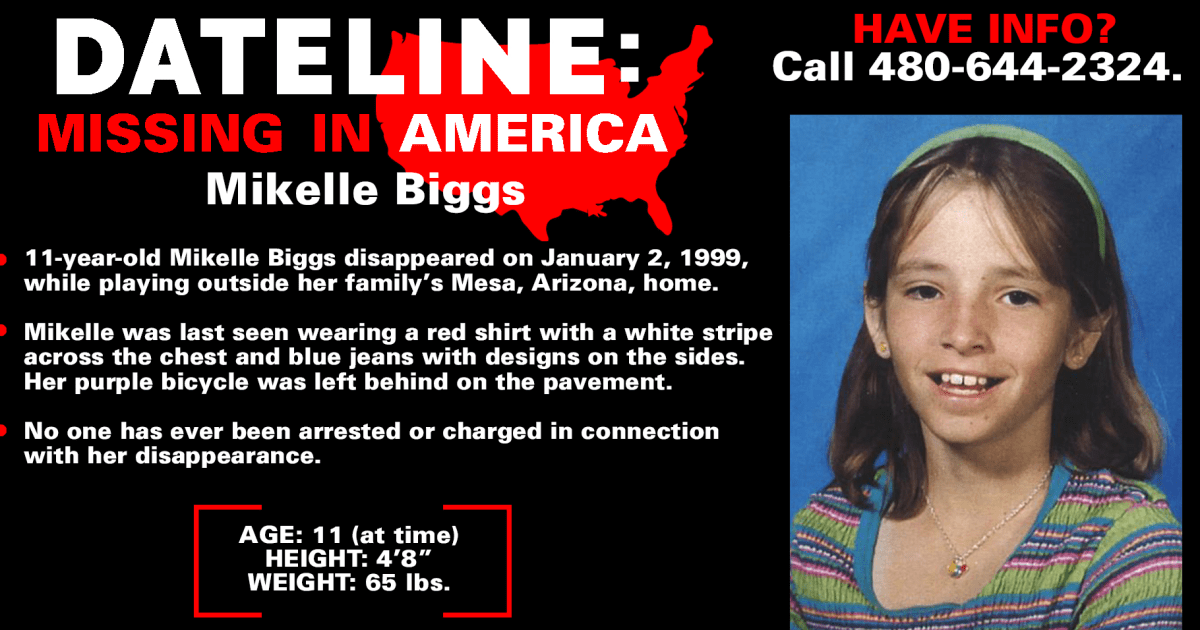She'll use her own experience to teach officers to avoid missteps.

www.azfamily.com
Mikelle Biggs’ sister hired to train officers on handling families of missing people
It’s been more than 24 years since one of Arizona’s most high-profile missing children cases began. Eleven-year-old Mikelle Biggs was abducted while riding her bike outside her Mesa home and never seen again. Her little sister was just 9 years old but she has spent much of her adult life advocating for her sister. Now, she’s been hired by a training center funded by the U.S. Justice Department to help train officers on how to better deal with families of missing children and victims.
Mikelle Biggs’ 1999 disappearance quickly gained the attention of America at the time. She was riding her bike, waiting for the ice cream man one second. The next, she vanished. Her bike tire was still spinning when Kimber Biggs came back outside. Kimber Biggs was two years younger than Mikelle and only in their house for 90 seconds when Mikelle was taken. “It’s a different type of effect on me than my parents, but it’s still very traumatic,” said Kimber.
It’s an unimaginable situation that’s been a part of her life, but now, in her 30s, it’s led to something new. “I just got a gut feeling that this is what I’m supposed to be doing,” Kimber said.
While Kimber isn’t new to advocating for her sister, she’s gotten the attention and respect of law enforcement, and now she’s starting a new journey because of it. The National Criminal Justice Training Center recently hired her to teach a training course to first responders and officers on how to best work with families with missing children and loved ones. “This is what it’s like to be a victim, and here’s how you can improve how you work with victims’ families and here’s what has been done that is beneficial to them,” she said.
In Mikelle’s case, she said a misstep in the police investigation quickly came to mind. “They kind of jumped to conclusions in my family’s situation and that made the whole thing that much harder,” Kimber said.
Those conclusions included casting suspicion on her father. Time and resources were spent on him as a potential suspect, only to have that not be the case in the end. “It’s really hard not to feel bitter about that. Not only for my dad’s sake but for the Mikelle’s case. What if? There’s always going to be that ‘what if.’ What if we missed something because of that,” Kimber said.
Kimber said she also wants to focus on how officers can ask questions with more compassion, especially with young kids like she was at the time her sister went missing.
Mikelle’s disappearance has shaped Kimber’s life, a situation she never asked for and was forced to grow up with. But now it’s not just having to talk about that horrific day but being able to actually smile about the difference she’s about to make for other families and detectives, all in Mikelle’s honor. “Taking something horrible that happened to me and using that to do good. That’s a really amazing feeling,” Kimber said.
The National Criminal Justice Training Center programs like the one Kimber will be a part of are funded by federal grants from the DOJ.
Kimber will undergo training in October and could begin speaking at trainings around the country as early as November of this year.






:max_bytes(150000):strip_icc():focal(145x0:147x2)/biggs1-1-b446c19f6bb64b13acde617983422360.jpg)
:max_bytes(150000):strip_icc():focal(706x0:708x2)/biggs4-2000-2f2ce0370b514e9ba73907517507e02d.png)
/cloudfront-us-east-1.images.arcpublishing.com/gray/KPJJCUPOAZFSZMSPKTQUMU34II.png)





